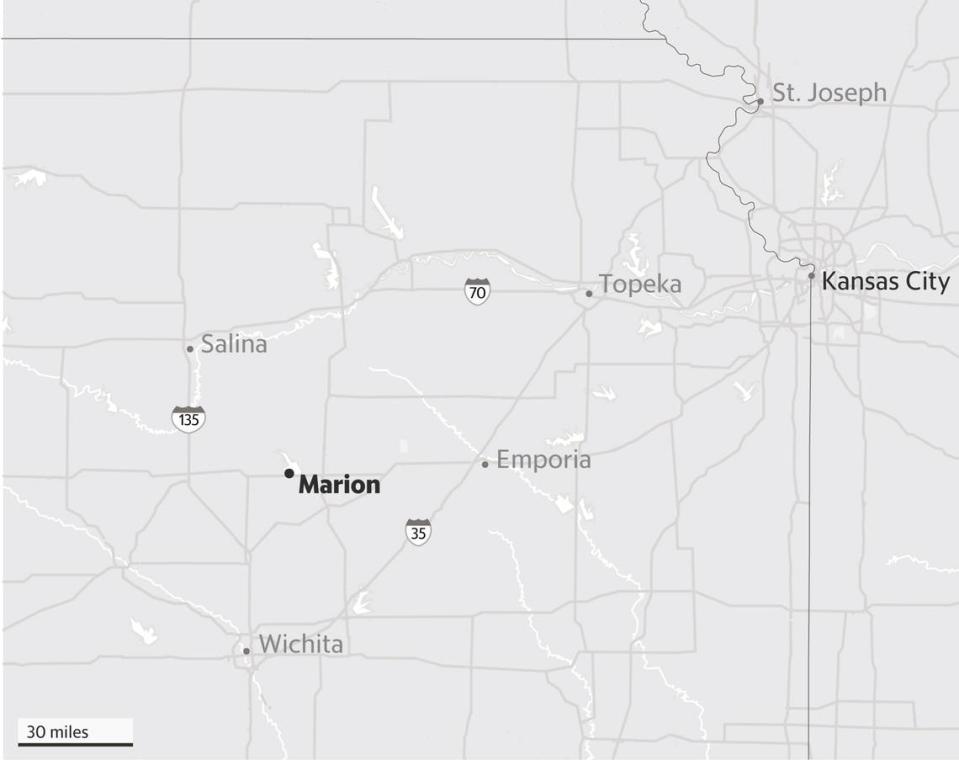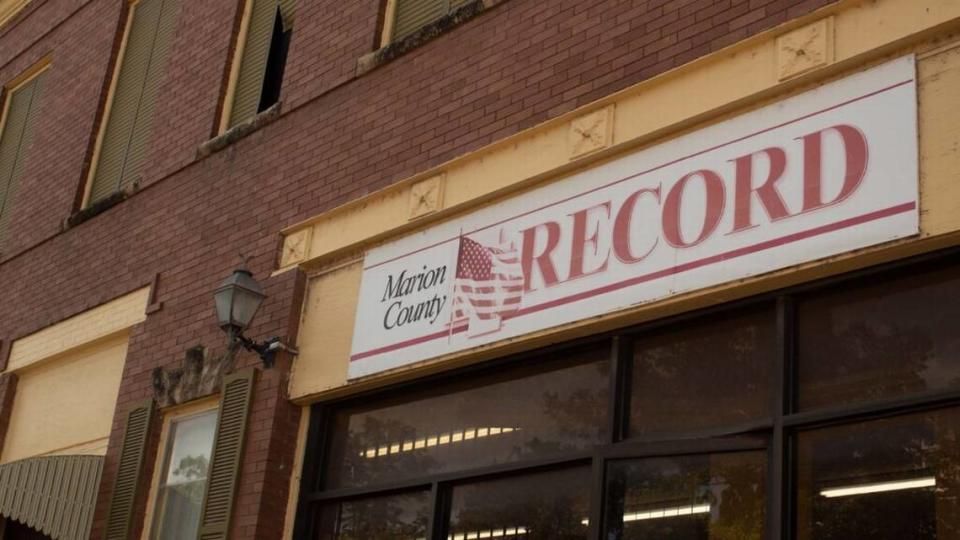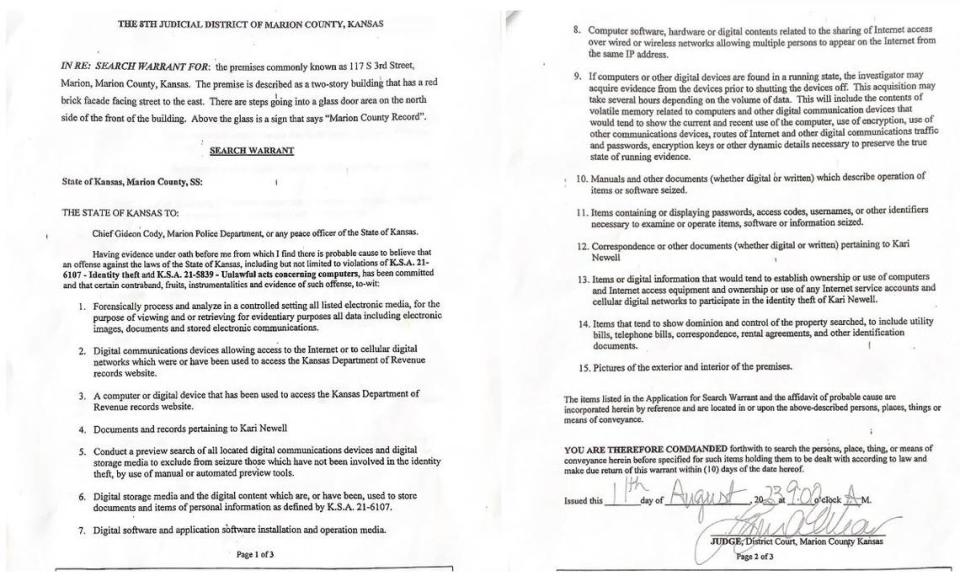Kansas newspaper raided, shut down by police had investigated chief who came from KCPD
A small-town Kansas newspaper was investigating the background of a local public official before it was shut down by a police raid Friday, according to the newspaper’s publisher.
The public official in question?
The recently hired police chief, Gideon Cody, who had just left the Kansas City Police Department as a captain after 24 years.
Cody was the same police official who led the raid on the offices of the Marion County Record, backed by Marion’s entire five-officer police force, along with two sheriff’s deputies. The raid, previously reported on by the online news outlet the Kansas Reflector, effectively stopped publication of the paper and placed a national spotlight on Marion, a city of fewer than 2,000 people about 160 miles southwest of Kansas City.
A search warrant shows police were looking for evidence that a reporter had run an improper computer search to confirm a report that a local business owner applying for a liquor license had lost her driver’s license over a DUI.

The owner and publisher of the Record, Eric Meyer, along with First Amendment advocates and journalism organizations from across the country, have said the raid went too far.
Police seized computers, cellphones and reporting materials from the newspaper, its reporters and the home of the publisher. Meyer said police injured a reporter’s finger while taking away her cellphone.
Meyer’s 98-year-old mother, Joan Meyer, a newswoman for decades and a co-owner of the paper, was upset by the police search of the home she shared with her son.
She died Saturday.
“That’s one of the things my mother said Friday night before she died,” Meyer said Sunday. “Which is, ‘Where are all the good people that are supposed to stop this? How come these people that think they’re thugs, think that they’re part of the Gestapo, can come in and just bully people?’”
Meyer said he worries what the ordeal is doing to his city’s reputation.
“They’ve got to be stopped from doing this,” he said of the city’s police department. “This is just intimidation tactics.”
“But what concerns me as a citizen is I hate the bad name that it’s giving Marion,” Meyer added.

Marion County record investigated new police chief
Meyer said the Marion Police Department would not have even known about the newspaper’s investigation of the local business owner if the newspaper had not told them.
“We sent them a note saying that a source had given us a file that we thought had suspicious origins,” Meyer said. “We checked it out to verify that it was accurate, but were not planning to do anything with it.”
Meyer said he told police that if they had questions about it, they should contact the newspaper.
“They never did,” he said. “Their response was the typical fashion of a bully. Instead of asking a question or getting material, they came with an atomic flyswatter to seize our equipment and apparently tried to put us out of business.”
Meyer said that, before the raid, his newspaper had investigated Cody’s background and his time at the Kansas City Police Department before he came to Marion. He declined to provide details of the newspaper’s investigation of Cody.
“I really don’t think it would be advisable for me to say what it was we were investigating, other than to characterize the charges as serious….,” Meyer said.
He told The Star the newspaper didn’t publish a story about the allegations.
“We didn’t publish it because we couldn’t nail it down to the point that we thought it was ready for publication,” he said. “He (Cody) didn’t know who our sources were. He does now.”
Meyer said the newspaper told city leaders they had received information about Cody but could not confirm it.
“But, you know, in a small community, we’re at least going to give you the heads up that you might be doing something,” he said he told city officials. “You should check his background.”
Meyer said the newspaper contacted the Kansas City Police Department’s human resources department and asked if anyone had inspected Cody’s employment file. He said they were told that no one had.
Two days later, Meyer said, the newspaper again contacted Kansas City police, who said that someone had inquired about the file but had asked only for information in which Cody had been found guilty and there was an action taken against him.
In an exclusive interview with The Star on Sunday, Cody said that if the Marion County Record had found anything newsworthy to publish, it would have done so.
“If it was true, they would’ve printed it… obviously they are reporters, they chose not to print it for a reason,” Cody said.
“I have already been vetted. They’ve (the newspaper) actually did a background on me. And that’s why they chose not to (publish a story).”
Cody continued, “however, if they can muddy the water, make my credibility look bad, I totally get it. They’re gonna try to do everything they possibly can.”
A spokesperson for the Kansas City Police Department did not immediately answer questions this weekend about Cody’s time with the force.

Meanwhile, criticism of the police action continued to grow.
On Sunday afternoon, The Reporters Committee for Freedom of the Press, along with 30 news media and press freedom organizations, released a four-page letter emailed to Cody condemning the raid.
“Newsroom searches and seizures are among the most intrusive actions law enforcement can take with respect to the free press, and the most potentially suppressive of free speech by the press and the public,” the letter said. “Based on public reporting, the search warrant that has been published online, and your public statements to the press, there appears to be no justification for the breadth and intrusiveness of the search — particularly when other investigative steps may have been available — and we are concerned that it may have violated federal law strictly limiting federal, state, and local law enforcement’s ability to conduct newsroom searches.”
The letter urged Cody to “immediately return the seized material to the Record, to purge any records that may already have been accessed, and to initiate a full independent and transparent review of your Department’s actions.”
Reporters Committee for Freedom of the Press letter by Ian Cummings on Scribd
Marion police chief defends raid
Critics and legal experts say the search warrant signed by Magistrate Judge Laura Viar and used to seize the newspaper’s equipment violates federal law that provides protections against searching and seizing materials from journalists. The Privacy Protection Act requires authorities to subpoena materials instead.
Emily Bradbury, executive director of the Kansas Press Association, told the Kansas Reflector the police raid is unprecedented in Kansas.
“An attack on a newspaper office through an illegal search is not just an infringement on the rights of journalists but an assault on the very foundation of democracy and the public’s right to know,” Bradbury said. “This cannot be allowed to stand.”
Cody acknowledged that federal law protects journalists from most searches of newsrooms by federal and state law enforcement officials. But he said those protections did not apply if the journalists were themselves suspects in a criminal investigation.
“We’re well aware of how the protection acts work,” he said.
“It is true that in most cases, it requires police to use subpoenas, rather than search warrants, to search the premises of journalists unless they themselves are suspects in the offense that is the subject of the search.”

In a written statement, Cody said, “I believe when the rest of the story is available to the public, the judicial system that is being questioned will be vindicated. I appreciate all the assistance from all the State and Local investigators along with the entire judicial process thus far.”
Cody said the case was not a First Amendment issue.
“This is a Fourth Amendment issue, and the police are protecting people’s Fourth Amendment, but you have to come to that conclusion on your own. Because I can only speak in generalities right now because this is an open investigation and I cannot speak on it.”
The Fourth Amendment to the U.S. Constitution protects people from unlawful searches and seizures by the government. But it is not a guarantee against all searches and seizures — only those deemed unreasonable under the law.
Attorneys say Marion police are wrong on law
Max Kautsch, a media attorney and president of the Kansas Coalition for Open Government, said while it is indeed the Fourth Amendment that protects the public against unlawful searches and seizures, “so far, law enforcement has not revealed how the publicly available evidence, which is extensive, provides probable cause to believe that a crime has been committed.”
“What the publicly available evidence suggests instead is that the Marion County Record was gathering and reporting truthful information about a matter in the public interest, not engaged in criminal activity,” Kautsch told The Star in an email. “A search warrant based on insufficient probable cause violates the Fourth Amendment.”

Kautsch also said the case does raise a First Amendment issue, “because the action taken by the authorities appears to be in retaliation for bringing publicly available information to the attention of local authorities about a matter of public interest.”
“Ultimately, it is difficult to fully evaluate law enforcement’s conduct without access to the affidavit in support of the search warrant.”
Bernie Rhodes, an attorney who is representing the Marion Record and also represents The Star, said Cody was wrong in claiming the raid did not violate the federal Privacy Protection Act when officers seized computers and other items from the newsroom.
The law requires a high burden of probable cause to believe that a crime had been committed by a reporter, Rhodes told The Star.
It is lawful for a reporter to access the state’s Department of Revenue website to confirm information that a confidential source had provided them. The newspaper had information about the local business owner but chose not to publish it, he said.
“Nothing that paper did gets even remotely close to rising to the level of probable cause that a crime was committed,” Rhodes said.
The law requires that a hearing is held before reporters are compelled to provide their source material.
By his actions, Cody is violating Kansas law as well as provisions of the First and Fifth amendments to the Constitution, Rhodes said.
“His belief that he’s (Cody) complying with federal law is simply a joke and that’s to ignore state law. Kansas law recognizes both a privilege for confidential source information and which he just completely ignored when he seizes everything in the newsroom,” he said.

